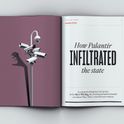Brexit’s legacy of mistrust
Nathalie Tocci (“Wake-up Call”, May) makes a compelling case for Europeans, caught between Trump and Putin, finally to take responsibility for their own defence. But where does this leave us Brits after Brexit? All prime ministers strive to avoid having to choose between the US and Europe, and Keir Starmer has so far managed to ride both horses, courting Trump skilfully, while showing leadership in Europe over support for Ukraine.
But things will get tougher. Starmer’s projected EU reset has always centred on a defence and security pact—and the 19th May EU-UK summit will be decisive. The core task is finding a way to associate Britain with ambitious EU plans for collective rearmament. Brexit excluded it from earlier efforts, but now both sides need each other; the continent’s full resources must be combined to wean it off US technology and capabilities. The post-Brexit arrangements for civil research and training cooperation, Horizon, show how fruitful such cross-Channel cooperation can be—and suggest a possible model for defence.
But the Brexit legacy of mistrust remains. Europeans worry whether the UK is ready to abandon its self-appointed role as America’s loyal first lieutenant in Europe or reduce its technological dependence on the US, from F-35 aircraft to satellite imagery to Trident missiles. An untimely US-UK trade deal, especially one indulgent of US Big Tech, would sharpen such fears. Britain, meanwhile, sees no reason to link unrelated issues, such as fish, to the defence pact. Without statesmanship on both sides, the two-horse rider could end up in the dust—and with him the best hopes for sovereign European defence.
Nick Witney, European Council on Foreign Relations
Europe gets real
Dear Mr Bolton (“Europe could blow the west apart”, May), please remove your rose-tinted spectacles. There is every reason to believe, in Europe, that the US can no longer be relied on as a defender of anything or as a partner for defence. Donald Trump may not think in terms of policy, but look at some of his recent actions, such as shutting down all satellite intel and systems to Ukraine without warning just as they faced a new offensive from Russian forces. Next, disrupting key elements in the F-16 fighter jets, Patriot missile batteries, and Himars and ATACM missile systems that Ukraine uses. Not unreasonably, Europeans think that if he can do this to a nation fighting for its very survival, he will do it to any other ally Russia chooses to attack.
The UK is now in the unenviable position of having many of its key weapons and defence systems at the mercy of a rogue president leading a party that shows no desire to moderate his vindictive actions. Unlike the US and UK, a large swath of Europe knows exactly what Russian occupation or domination means, and thinks it a good idea to not be at the mercy of a man who favours -random acts of vindictiveness.
Perhaps the biggest wake-up is for Europe, which, whatever Trump and his money-grubbing cohorts think, has bought many, if not most of its weapons of defence from US arms suppliers. Naturally, they are alarmed to hear that Trump is capable of rendering some of these inoperable or ineffective. They are also aware that 46 months of this utter lunacy is a long, long time, in which the entire defence capability of Europe could be trashed. Starmer presumably has in mind the UK’s dependence on various defence partnerships with US firms and the US military, but is also, I hope, looking at decoupling it from an ally who has declared that Russia can do “what the hell it wants” in Europe. The question must also be asked what intel from the other members of Five Eyes and Nato is now released directly to the Kremlin.
Europe and the other members of Nato have every right to take a long, hard look at their own defence needs and, if necessary, build a new defence alliance without the US. Especially if, as seems very likely, the next regime will be a continuation of this one.
Patrick G Cox, author, via the website
The extremists that gathered together to write Project 2025 will not vanish with a change of administration. Further, this is not an aberration. It is part of our history come back to haunt us. We are seeing the resurgence of that collection of ignorant supporters and powerful oligarchs that controlled the federal government during the first half of the 19th century, known to their opponents as the Slave Power, but really a reflection of feudalism and manorialism. Resisting them led to the civil war.
You need only look at the election results by county to see the historical geopolitical roots of today’s political divide, when comparing it to the map of Civil War America. That divide did not start with, and will not end with, Trump. “America” is not a “centre-right” nation. It is several “nations” with quite different values. The America that saved Europe was the America of the “North”, industrial, freedom-loving, civilly engaged, generous. America today is the America of the “South”… and all that that brings to mind for those that know our history.
Candice H Brown Elliott, via the website
The truth about Chagos
Nigel Biggar (“Labour’s blind faith in international law”, Prospect online, April) focuses on the legalities of the forthcoming UK-Mauritius treaty and ignores the political realities as to how to bring this 60-year-old dispute to an end. The article opens with, “Quite why Keir Starmer’s government is so determined to surrender the strategic Chagos Islands to Mauritius remains a puzzle”, and then goes on to suggest it is a smokescreen for something else. It is neither a surrender nor a smokescreen. Nor is it a puzzle.
Under the 1965 Lancaster House Agreement, the UK excised Chagos but gave Mauritius a legally binding undertaking to “return” the islands when no longer needed for defence. Only Diego Garcia is still needed. A 99-year lease for the use of this island with an option for extension gives the base full security and legal legitimacy, an arrangement which the US has now approved. Although there have been discussions between the UK and Mauritius since 1982, the real negotiations began under the previous British and Mauritian governments in 2022. The government’s purpose was to end nearly 60 years of uncertainty over the future of the base and the Chagossians.
After 55 years in exile, Chagossians will soon be able to visit or resettle in their homeland. Compliance with international law, UN General Assembly resolutions and the rulings of the International Court of Justice (ICJ) and other international courts and tribunals will restore the UK’s reputation on the international stage as a law-abiding nation. It may also enable the UK again to be elected to the ICJ, other international courts and UN human rights bodies, having lost its traditional seats, including in the ICJ, in part due to its intransigence over Chagos. It will end the UK’s international isolation in the UN, Commonwealth, African Union, EU and European Parliament on this human rights issue. During his visit in 2019 to Mauritius, the late Pope Francis met Chagossians, espoused their cause and told the press that the UK had to return the islands to Mauritius.
The proposed treaty is the best possible outcome for the Chagossians, UK, Mauritius, US, the UN and the rule of law.
David Snoxell, former British high commissioner to Mauritius and coordinator of the All Party Parliamentary Group on the Chagos Islands
Donor dependency
Reform’s concentrated funding base deftly outlined by Peter Geoghegan (“Who Funds Reform?”, May) represents just the tip of a troubling democratic iceberg. Our research at Transparency International UK has found a growing problem with how our political parties are funded.
In 2016, more than half of all reported donations to EU referendum campaigners on both sides of the debate came from just 10 donors. By 2023, the dependency on big donors was entrenched—fewer than 20, each giving a million pounds or more, provided two-thirds of all private donations, totalling £56.5m.
This financial stranglehold on our democracy has not gone unnoticed by voters, fuelling perceptions that political decisions are made in the interests of big benefactors. A recent poll found that 63 per cent of the public believe the very rich have too much influence on UK politics.
An increase in campaign spending limits from £19m to £34m put the 2024 general election on track to be the most expensive yet. Unlimited campaign spending in the US driven by “Super Pacs” following the Citizens United ruling on campaign finance should serve as a warning of what happens when money overwhelms a democratic election.
The solution is clear: take the heat out of election spending by reducing campaign spending limits and introducing donation caps. A promised elections bill is the government’s chance to restore trust and democratise the financing of UK politics. Now is the time for meaningful reform that takes this issue seriously and restores public confidence.
Rose Whiffen, Senior Research Officer, Transparency International UK
The liberal message
I really enjoyed Sasha Mudd’s insightful article about Nietzsche (“Maga’s moral revolution”, May). How can we be sure that this message reaches the successors to Chuck Schumer and Nancy Pelosi, reaffirming our commitment to liberal values, explaining what they are and why they’re so important to us individually and nationally, rather than just assuming everyone agrees and values them as much as we do? This message needs to be spread without condescension but with passion, commitment and vigour, a mastery of relevant facts (think Pete Buttigieg or Jasmine Crockett), smart use of social and conventional media and coherent messaging that wrests control of the narrative away from the right. We must stop being painted into ideological dead-ends of false binaries and monstrous misrepresentations.
Joan Witte, via email
Inescapable dogma
In the closing paragraphs of Peter Hoskin’s review of Leor Zmigrod’s The Ideological Brain (“Brain damage”, May), the book’s author ponders “Is the psychology affecting our politics, or is the politics affecting our psychology?”, and suggests we might need to envision an “anti-ideological” brain—“An existence that actively and creatively rejects the temptation of dogma”.
If an anti-ideological brain truly existed, then it wouldn’t (and couldn’t) exist in a conventional political system. That would be a complete and unworkable paradox: politicians by nature are adherents to dogma, whether rigidly or less so; whether consciously or not. Likewise the people who vote for them, however liberal or leftfield they might think they are. An anti-ideological brain will, by definition, deliberately steer well clear of all dogma, thereby all things political—politics, politicians and voting. If millions of anti-ideological brains did this then it might just change failing political systems for the better. Or it might lead to even worse political systems, filled with politicians who—aware that ever fewer people are interested in them—deliver even less and care even less.
Stefan Badham, Portsmouth
Life after Just Stop Oil
Obstacles to environmental progress were quite formidable pre-pandemic. But Covid-19 (“Climate activism after Just Stop Oil”, Prospect online, March) not only stalled most projects being undertaken, it added greatly to the already busy landfills and burning centres with disposable masks and other non-degradable biohazard-protective single-use materials.
Too many people continue throwing non-biodegradable garbage down a dark chute or flush pollutants down toilet or sink drainage pipes as though they’re dispensing that waste into a black-hole singularity where it’s compressed into nothing. Also, increasingly problematic is the very large and growing populace too overworked, worried and even rightfully angry about the cost of living to criticise various industries for the environmental damage they cause.
Frank Sterle Jr, via the website
Labour’s benefits cheat
I am a member of the Labour party and I have a severely disabled brother who relies on benefits (“The devastating reality of disability benefit cuts”, Prospect online, March). These two things now seem in conflict. I feel that I am a member of a party that is attacking the vital benefits that my brother receives.
Rachel Reeves describes these as “hard choices”. It is a choice to attack the poor and vulnerable rather than tax the rich or go after the billions in unpaid taxes.
Any Labour MP who helps push through these cuts should hang their heads in shame, and may want to consider joining the benches opposite, where they will surely be welcomed.
Richard Hallatt, Sheffield
A rich harvest
Most of your readers, if not all, will share my disappointment to read that Tom Martin, of Farming life fame, has decided to bring his column to a close (Lives, May). Not only has he highlighted the delights and hardships of life on a farm with lucidity and gentle compassion, but he has done so using accurate, descriptive and entertaining language on a par with the very best in journalism.
I hope he continues to write about his subject in his own time, and indeed, I have no doubt that a collection of his writing over the past three years would be a book to be treasured by readers from all backgrounds for many years to come.
Gregory Rosenstock, Chichester












